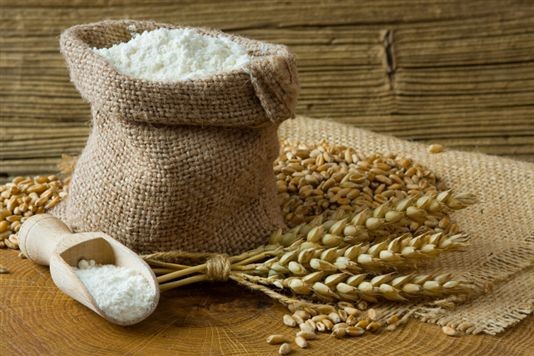
Don't skimp on flour - treat yourself to an artisan bag, from one of our top five UK producers.
Sharpham Park, Somerset
With the Glastonbury Tor in the background, and red deer frolicking in the fields, it’s impossible not to enjoy a visit to Sharpham Park. The 300 acre historic park specialises in growing and milling spelt, a nutritious and healthy ancient grain, and also rears rare breed White Park cattle, red deer and Hebridean and Manx Loghtan sheep.
Spelt is a cross between Emmer wheat and Goats grass and has a distinctive, nutty flavour. You can make everything from pasta to biscuits, beer, gin and vodka with spelt, and Sharpham Park mill their own spelt grains to make spelt flour.
The key difference between spelt and wheat is the molecular structure of the protein in the gluten, which is shorter and more brittle and therefore easier for the body to break down and digest. Because the gluten in natural spelt is soluble, it can be used by people with wheat intolerance or IBS.
It’s also rich in protein, and The Romans called spelt their ‘Marching Grain’ because of its high energy content. You can find your local Sharpham Park spelt flour stockist here, or shop online. Why not make one of their recipes with your new bag of flour?
£3.10 for a 1kg bag of wholegrain spelt flour.
Doves Farm, Berkshire

They make their own biscuits, cookies, cereal bars, breakfast cereals, and pasta, and the gluten free flour on offer includes gluten and wheat free self-raising flour; brown or white bread flour; rusk breadcrumb; gram flour; and even a gluten free biscuit crumb.
Head to the Doves website for great gluten free recipes, including such delights as almond rye shortbread, Aphrodites flan, banana quinoa cake, and barleycorn bread.
£2.15 for a 1kg bag of gluten & wheat free self-raising flour
Redbournbury Mill, Hertfordshire
It’s a working watermill producing a range of stoneground organic flours, principally from locally grown grains. Volunteers run the whole place, and it was extensively restored following a fire 25 years ago.
Most of the machinery at the mill is Victorian – the ‘hurst frame’ was built in the mid-nineteenth century – and the whole mechanism is unique, because of the horizontal ‘lay shaft’ resulting in three pairs of stones being in a straight line; they are normally arranged around a circular central gear.
All Redbournbury wheat flour is milled on a pair of French Burr Stones, and some is then sieved into a traditional bolter (or wire-machine) to produce white flour, brown flour, semolina flour and bran. You can visit the mill to buy flour, or head to one of their stockists.
£2.20 for a 1.5kg bag of wholemeal flour
Letheringsett Watermill, Norfolk
Spelt is milled here, which is higher in vitamin B and protein than any other wheat. They also make whole wheat flour, and both are available for purchase from the Letheringsett Mill shop along with a good selection of dried fruit, nuts, oats and muesli. You can check out their stockists here.
Maud Foster Windmill, Lincolnshire
The mill, originally built in 1819, was brought in 1987 by the present owners, The Waterfield family, but needed extensive repairs, including three new sails. Now it produces its own organic flour, porridge oats and muesli, all of which are sold in the Mill Shop downstairs. And holidaymakers can even stay over in the windmill now!
£2.40 for a 1.5kg bag of organic white flour
You might also like